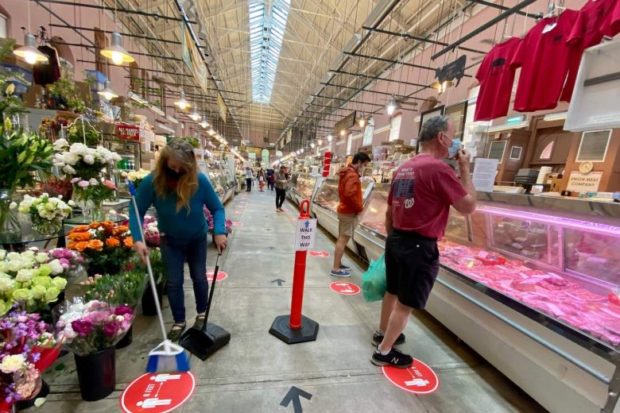No shortcuts; people must get used to a new way of living, warns WHO’s chief scientist

Shoppers wearing masks look at meat at Eastern Market in Washington DC, on May 17, 2020. AFP via The Straits Times/Asia News Network
WASHINGTON — It is critically important for governments to present facts in a way that people really understand what the Covid-19 coronavirus is, and the logic behind some of the measures put in place, says Dr Soumya Swaminathan, chief scientist at the World Health Organization (WHO).
When countries open up, their basic principle must be to test people with symptoms, identify the contacts and quarantine them until they are free of the risk of getting the disease, she said in an interview.
“Those basic principles will have to be actually followed by governments and cities everywhere. There’s no shortcut to that,” she warned.
“Communities must be involved and engaged, and understand the rationale for loosening and reinstituting measures, because we are now moving into a phase of a long term change in the way that society is going to function,” Dr Swaminathan said on the phone from Geneva.
“It’s really quite a delicate balance, I would say, between creating too much fear and panic, but at the same time underlining the seriousness of this infection,” she said.
Article continues after this advertisement“And the fact that until the time we find a vaccine and not just find a vaccine, but get it to enough people around the world, so we develop immunity, there’s got to be big changes – in the way we behave at home and in the workplace and out, when we’re shopping or taking a holiday or whatever.”
Article continues after this advertisement“The public needs to hear the facts,” she stressed. “And it’s a changing science as well, because every day you learn something more about this virus and how it’s transmitting and so on, and about its biology, but also advances being made in treatments and in vaccines. And the public health measures that work, and some that don’t work.”
“So it’s important for the leaders to really keep the public well-informed of the times, because it’s very difficult really to have a behavior change that one is expecting at this scale without a massive effort in communication. And, I think, also leading by example,” she said.
“People and communities must really understand why governments are doing certain things, and why it’s important for individuals to do certain things – because they’re protecting themselves, they’re protecting others. And to understand that if people do not follow those measures, then you could be back in a very bad situation again,” she warned.
Dr Swaminathan spoke to The Straits Times as parts of the world begin to return to business as usual after prolonged lockdowns.
In the US, some states are doing so cautiously, but some even before they have met the White House’s conditions for a first phase for reopening – 14 straight days of decline in hospitalisations for Covid-19.
But 36.5 million Americans have lost their jobs since mid-March. Some states have seen small but forceful and headline-grabbing protests by right wing groups demanding a return to business. The emotional intensity of the political divide has soared. The country on Sunday night was nearing 90,000 deaths from Covid-19 and is on track for 100,000 by June 1. Misinformation and political messaging distort facts and confuse many Americans.
“Sometimes scientists will talk in language that’s very hard to follow,” Dr Swaminathan said. “So being able to present the facts in a way that people really understand… is important.”
Especially critical risk areas are places where there will be crowding, she said. These include dense urban conglomerations such as slums in many cities including Mumbai, which has had a surge in cases, migrant and refugee camps as well as in prisons. Governments need to plan measures for these contingencies, she said.
“If you do not do all these things, don’t test and track and isolate and quarantine, then you would get these huge outbreaks, which you realize only when people get sick enough and start showing up at hospitals,” Dr Swaminathan said.
“That’s because there’s always a lag between people getting the infection and then getting sick enough. That’s like the tip of the iceberg, which is what we’ve seen in Europe and North America.”
For more news about the novel coronavirus click here.
What you need to know about Coronavirus.
For more information on COVID-19, call the DOH Hotline: (02) 86517800 local 1149/1150.
The Inquirer Foundation supports our healthcare frontliners and is still accepting cash donations to be deposited at Banco de Oro (BDO) current account #007960018860 or donate through PayMaya using this link.